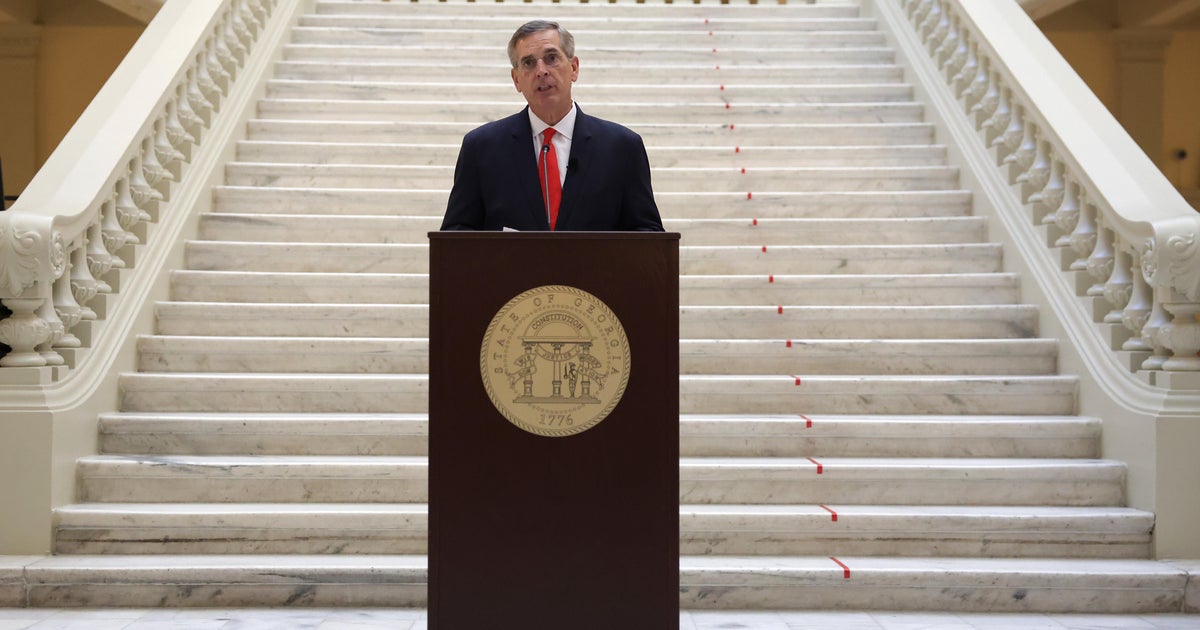CBS News
How much will credit card debt forgiveness cost you? Here’s what to know

Getty Images/iStockphoto
If you’re dealing with high amounts of credit card debt, you’re well aware of how difficult it can be to get rid of. For starters, the interest charges on your credit card debt can compound quickly, especially in today’s high-rate environment. Persistent inflation issues over the last year have also caused housing, gas and grocery prices to skyrocket, leaving many people strapped for cash. So, there may not be enough leftover in your budget to cover more than just the minimum right now.
As your credit card debt burden grows, it makes sense to look for alternative ways to tackle it. There are lots of options to consider, but for many, credit card debt forgiveness (or debt settlement) can be an attractive solution. The goal of these programs is to negotiate with your creditors to reduce your debt, allowing you to pay just a portion of what you owe.
But while debt forgiveness can provide much-needed relief, it comes with costs — some of which aren’t immediately apparent. So before enrolling, it’s essential to carefully weigh the potential expenses against the benefits to ensure it’s the right move for you.
Need more help with your debt? Compare your top debt relief options here.
How much will credit card debt forgiveness cost you? Here’s what to know
When considering credit card debt forgiveness, the legitimate expenses you may encounter include:
Debt relief company fees
The debt relief companies that offer debt forgiveness programs typically charge fees for their services, which generally range from 15% to 25% of the enrolled debt amount. For example, if you’re trying to settle $20,000 in credit card debt, you could end up paying between $3,000 and $5,000 in fees alone. It’s worth noting that creditors aren’t required to settle your debts, either. This can leave you with partial debt resolution and additional costs over time.
Find out more about how credit card debt forgiveness could pay off for you today.
Tax liabilities
Another significant cost to consider is the potential tax liability of debt forgiveness. The IRS generally considers forgiven debt over $600 as taxable income. This means you might receive a 1099-C form and need to report the forgiven amount on your tax return, potentially resulting in a higher tax bill or reduced refund. For example, if you have $15,000 in debt forgiven and you’re in the 22% tax bracket, you could owe an additional $3,300 in taxes.
Interest and late fees
When you first start the debt forgiveness process, you stop making payments on the account and instead make monthly payments to the debt relief company, which is held in an account and later used for lump-sum settlement payments. In turn, the interest and late fees continue to accrue on your accounts. This can increase your overall debt balance, potentially offsetting some of the savings from settlement. A credit card with a 20% APR on a $10,000 balance, for example, could accrue an additional $2,000 in interest over a year.
Legal fees
There’s also the risk of legal action to consider. When you stop making payments, your creditors may pursue legal action against you — even if you’re enrolled in a debt forgiveness program. This could result in additional legal fees if you need to defend yourself in court, and any judgments against you could lead to wage garnishment or asset seizure.
Future borrowing costs
Your credit score is also likely to take a hit when participating in a debt forgiveness program. These negative marks can significantly lower your credit score and remain on your credit report for up to seven years, affecting your ability to borrow money at favorable interest rates in the future. That may not seem impactful now, but paying hefty borrowing rates after settling your debt can have a big impact on your finances.
How to lower the cost of debt forgiveness
If you’re considering debt forgiveness, there are several strategies you can employ to potentially reduce the associated costs, including:
- Negotiate on your own: Before turning to a debt settlement company, you may want to try negotiating directly with your creditors, as many are willing to work out a payment plan or settle for less than the full amount owed. This approach can save you the fees charged by settlement companies.
- Seek non-profit credit counseling: Many non-profit credit counseling agencies offer debt management plans at lower costs. They can work with your creditors to lower interest rates and create a manageable repayment plan.
- Prioritize debts strategically: If you have multiple debts, focus on settling the largest or highest-interest debts first. This can maximize your savings and potentially reduce the overall fees you’ll pay if using a debt relief company.
- Be cautious of upfront fees: If you do use a debt settlement company, look for one that charges fees only after successfully settling a debt. This aligns their interests with yours and ensures you’re not paying for services you haven’t received.
- Consider bankruptcy as an alternative: While it has its own set of consequences, bankruptcy might be a less expensive option in some cases, especially if you have a large amount of debt.
The bottom line
Debt forgiveness can be a smart avenue to consider if you’re dealing with compounding credit card debt that you can’t pay off on your own. However, there are extra costs to consider, so before making any decisions, be sure to do the math. You may find that the savings are substantial enough to justify enrolling, even with the extra fees, but in certain cases, it can make more sense to pursue other options instead.
CBS News
Los Angeles Times editor resigns after newspaper withholds presidential endorsement

The editorials editor of the Los Angeles Times has resigned after the newspaper’s owner blocked the editorial board’s plans to endorse Democratic Vice President Kamala Harris for president, a journalism trade publication reported Wednesday.
Mariel Garza told the Columbia Journalism Review in an interview that she resigned because the Times was remaining silent on the contest in “dangerous times.”
“I am resigning because I want to make it clear that I am not OK with us being silent,” Garza said. “In dangerous times, honest people need to stand up. This is how I’m standing up.”
In a post on the social media platform X that did not directly mention the resignation, LA Times owner Patrick Soon-Shiong said the board was asked to do a factual analysis of the policies of Harris and Republican former President Donald Trump during their time at the White House.
Additionally, “The board was asked to provide (its) understanding of the policies and plans enunciated by the candidates during this campaign and its potential effect on the nation in the next four years,” he wrote. “In this way, with this clear and non-partisan information side-by-side, our readers could decide who would be worthy of being president for the next four years.”
Soon-Shiong, who bought the paper in 2018, said the board “chose to remain silent and I accepted their decision.”
Garza told the Columbia Journalism Review that the board had intended to endorse Harris and she had drafted the outline of a proposed editorial.
A LA Times spokesperson did not immediately respond to an email requesting comment.
The LA Times Guild Unit Council & Bargaining Committee said it was “deeply concerned about our owner’s decision to block a planned endorsement in the presidential race.”
“We are even more concerned that he is now unfairly assigning blame to Editorial Board members for his decision not to endorse,” the guild said in a statement. “We are still pressing for answers from newsroom management on behalf of our members.”
Trump’s campaign jumped on Garza’s departure, saying the state’s largest newspaper had declined to endorse the Democratic ticket after backing Harris in her previous races for U.S. Senate and state attorney general.
Her exit comes about 10 months after then-Executive Editor Kevin Merida left the paper in what was called a “mutually agreed” upon departure. At the time, the news organization said it had fallen well short of its digital subscriber goals and needed a revenue boost to sustain the newsroom and its digital operations.
CBS News
10/23: CBS Evening News – CBS News

Watch CBS News
Be the first to know
Get browser notifications for breaking news, live events, and exclusive reporting.
CBS News
Georgia secretary of state’s office says it repelled cyberattack

The secretary of state’s office was the target of an unsuccessful cyberattack earlier this month, the agency confirmed to CBS News on Wednesday.
An official with the secretary of state’s office said the attack was an attempt to crash the absentee voting website, and it was discovered when the agency noticed a spike in attempts to access the site nine days ago, on Oct. 14. There were over 420,000 attempts made from around the world, which the official said was a coordinated attempt to make the website crash.
Security experts were ultimately able to thwart the attack. The secretary of state’s office said it still does not know who was behind the attack but suggested it may have been a foreign country.
Gabriel Sterling, chief operating officer for the office, wrote Thursday evening in a social media post that “this was a big win for our cyber security team and our partners. We work everyday to protect Georgia voters and our systems.” In a separate post, he said, “The attack was detected and mitigated quickly.” CNN first reported the cyberattack attempt.
The Cybersecurity and Infrastructure Security Agency is aware of the cyberattack and worked with the Georgia secretary of state’s office in the aftermath of the incident, sources confirmed to CBS News. The FBI has not responded to a request for comment.
Georgia voters have also been showing up for early voting, which began on Oct. 15. Early voters shattered records this year for the presidential election, the secretary of state’s office said, more than doubling early voting figures from 2020 on the first day, with 310,000 ballots cast, compared with 136,739 on the first day of early voting in 2020.
Georgia Secretary of State Brad Raffensperger predicted there would be record turnout in Georgia this year, telling CBS News’ Margaret Brennan on “Face the Nation” Sunday, “You look at the turnout — we’re almost pushing 1.4 million who’ve already voted early or who we’ve accepted their absentee ballots.”
Nicole Sganga and
contributed to this report.



